Presence of Foreign Ministry official at meeting in Manama on maritime, civil aviation security marks latest sign of warming ties between Israel and some Arab states
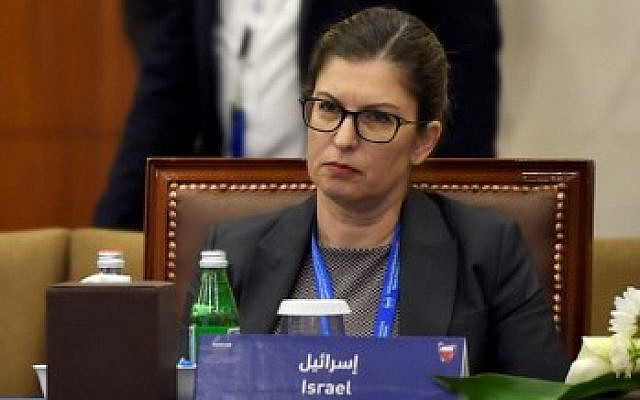
A senior Israeli official took part in a security conference in Bahrain on Monday, in a fresh sign of warming ties between Israel and some Arab states.
Dana Benvenisti-Gabay, the head of the Foreign Ministry’s regional security and counter-terrorism department, represented Israel at the conference in Manama, known as the Working Group on Maritime and Aviation Security.
The meeting, co-hosted by Bahrain, the US and Poland, is part of the so-called Warsaw Process, which started with the Ministerial to Promote a Future of Peace and Security in the Middle East that took place in the Polish capital earlier this year. That conference, co-sponsored by Poland and the US, was originally billed as part of global efforts to counter Iran, but was later toned down and instead focused on the vaguer goal of seeking stability in the Middle East.
Though Israel has ties with only two Arab states, Egypt and Jordan, there has been an opening with Bahrain and other Gulf states in recent years amid their shared antipathy toward Iran.
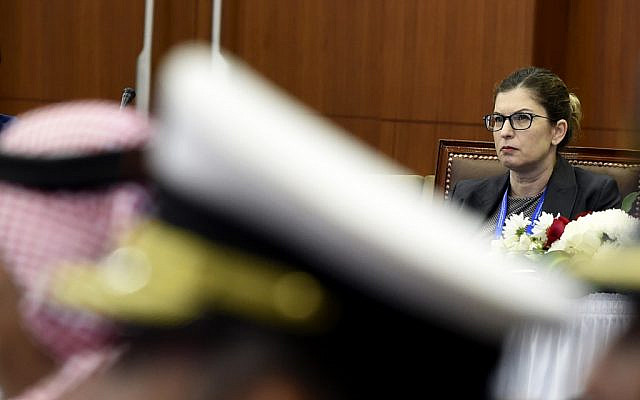
“The meeting is an occasion to exchange views on how to deal with the Iranian menace and to guarantee freedom of navigation,” Bahrain’s foreign ministry said on Twitter.
In a speech Monday before the meeting of 60 nations, Bahraini Foreign Minister Khalid bin Ahmed Al-Khalifa mentioned the recent attacks on Saudi oil infrastructure and on ships in the region, which have been blamed on Iran.
“These actions threaten global commerce, the stability of our global and interconnected economy, and the security of our region. The threat is serious and must be addressed,” he was quoted saying in a statement by Bahrain’s foreign ministry.
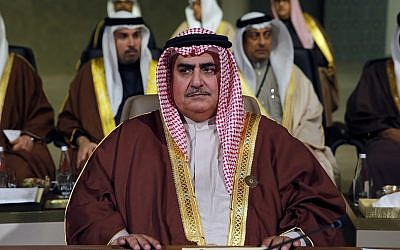
“We all must take a collective stand to condemn such acts and to take the necessary steps to protect our nations from rogue states, non state actors and terrorist groups that conduct such attacks and that seek to stabilize our globe,” he added.
He also called for continued efforts to prevent the spread of weapons of mass destruction.
Khalifa said the Gulf would host together with the US a “high level political meeting” in the first half of next year.
The Minister of Foreign Affairs, Shaikh Khalid bin Ahmed bin Mohammed Al Khalifa’s speech before the #Warsaw Process Working Group on Maritime and Aviation Security on October 21, 2019 pic.twitter.com/O0jtN2aLTo
— وزارة الخارجية 🇧🇭 (@bahdiplomatic) Oktubre 21, 2019
“This meeting comes at a critical moment in history,” US Secretary of State Mike Pompeo wrote in a letter to the meeting’s participants.
“The proliferation of weapons of mass destruction (WMD) and their means of delivery, whether by air or sea, poses a serious threat to international peace and security,” he wrote.
“Together, we must all be committed to taking the necessary actions to stop countries that continue to pursue WMD at great risk to all of us,” Pompeo said, in apparent reference to Iran.
The two-day Bahrain conference was not the first time Israeli and Arab officials sat together in the context of the Warsaw process. On October 8, an Israeli representative sat with colleagues from Bahrain, Saudi Arabia, United Arab Emirates, Yemen and other Arab states at a conference on cybersecurity in Seoul.
Three days later, Benjamin Krasna, Israel’s deputy ambassador to the US, participated in the Warsaw working group on human rights in Washington, which was also attended by many Arab countries.
Prime Minister Benjamin Netanyahu attended the original Warsaw conference in February, along with senior dignitaries from the Arab world.
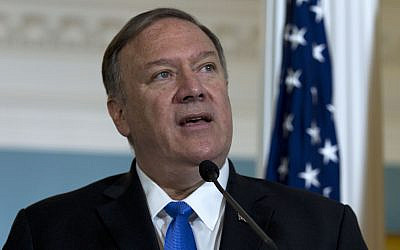
During the summit, he sat next to the Yemeni foreign minister. At a closed event on the sidelines of the meeting, which Netanyahu attended, the foreign ministers of several Arab states openly discussed the notion that the Iranian threat was a more pressing concern for the region than the lingering Israeli-Palestinian conflict.
Israeli and US officials hailed the event as a breakthrough.
“Tonight I believe we are beginning a new era, with Prime Minister Netanyahu from the State of Israel, with leaders from Bahrain, Saudi Arabia, and the UAE, all breaking bread together, and later in this conference sharing honest perspectives on the challenges facing the area,” US Vice President Mike Pence said at that summit.
In June, Bahrain hosted an American-led conference where US President Donald Trump’s peace team rolled out the economic aspects of its long-awaited proposal to solve the Israeli-Palestinian conflict.
While no Israeli officials were there, a number of the country’s businessmen and journalists were invited to attend the workshop.
“Israel is a country in the region… and it’s there to stay, of course,” Al-Khalifa told The Times of Israel in an unprecedented interview during the conference.
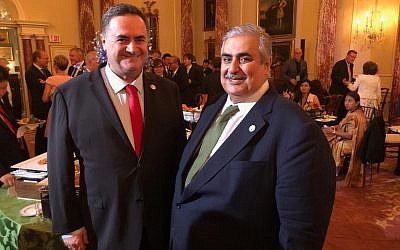
In July, Foreign Minister Israel Katz met Al-Khalifa for a brief chat on Iran in Washington and the two posed for a rare photograph, marking what Jerusalem said was a boost in ties with the Gulf nation.
The Monday conference’s stated focus on air and maritime navigation comes amid heightened tensions in the Gulf between the US and Iran since May last year when Trump unilaterally abandoned a 2015 nuclear deal between major powers and Iran, and began reimposing crippling sanctions in a campaign of “maximum pressure.”
Since then, ships have been attacked, drones downed and oil tankers seized drawing accusations of blame from Washington and Europe. Tehran has denied any involvement in the attacks. The attack on oil facilities in Saudi Arabia was claimed by Iran-backed rebels fighting a Saudi-led coalition in Yemen.
As reported by The Times of Israel
